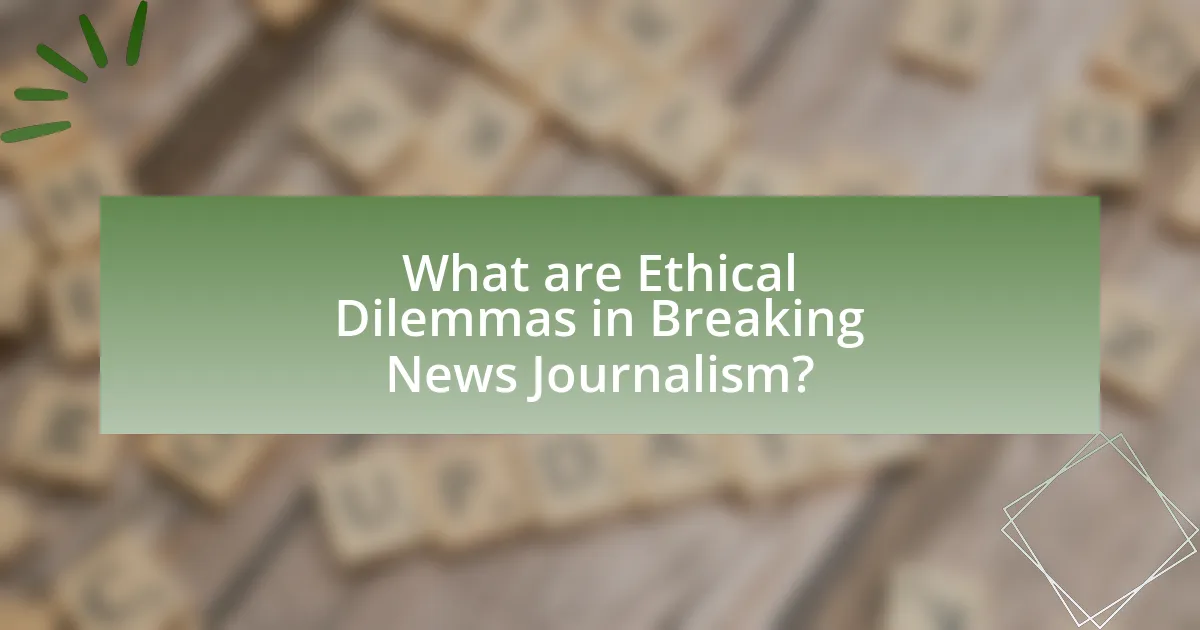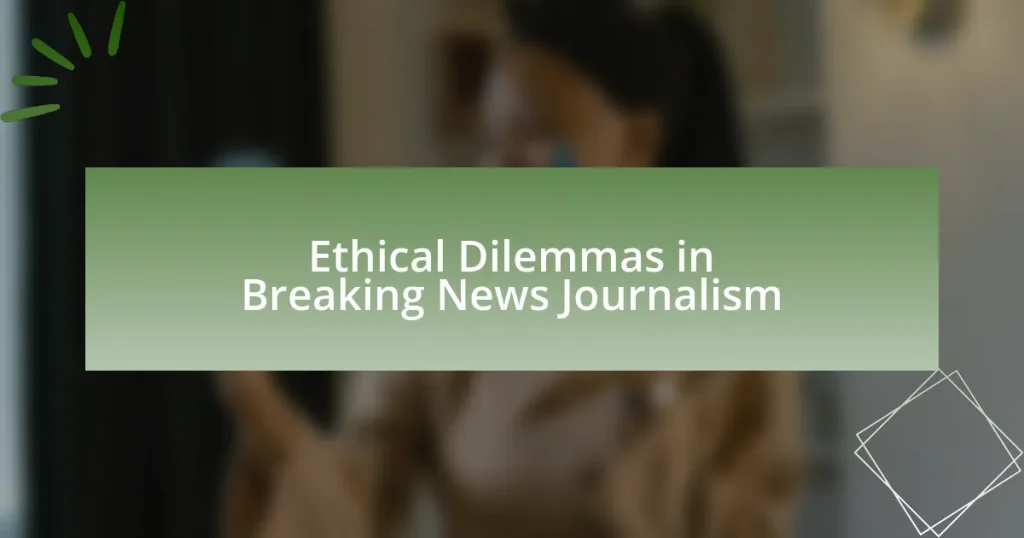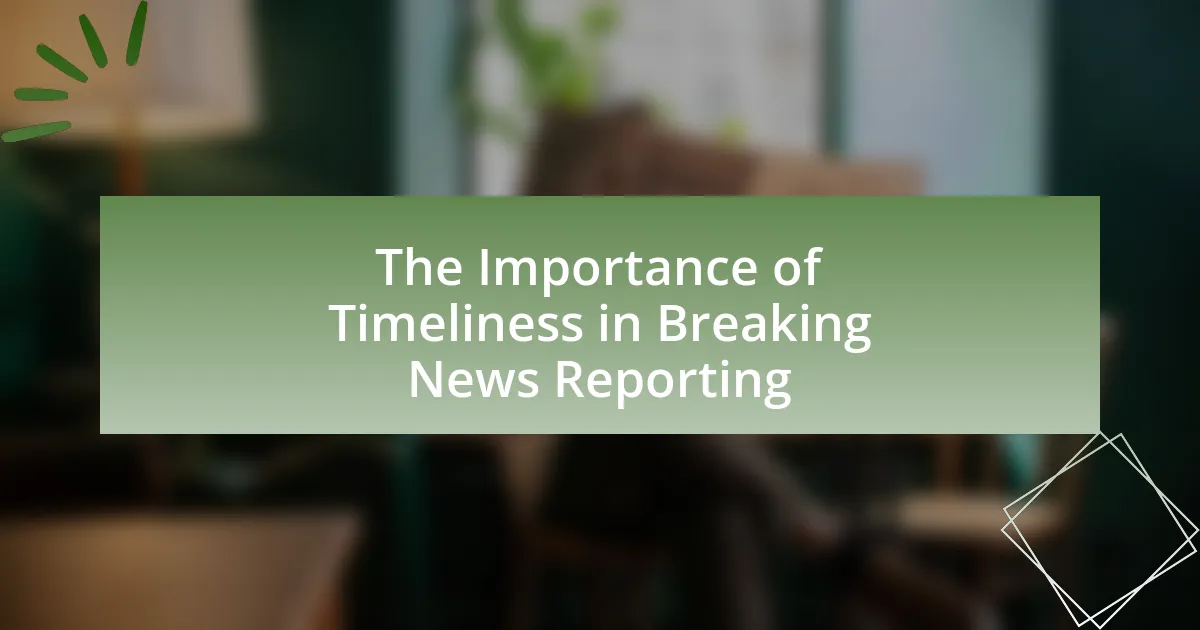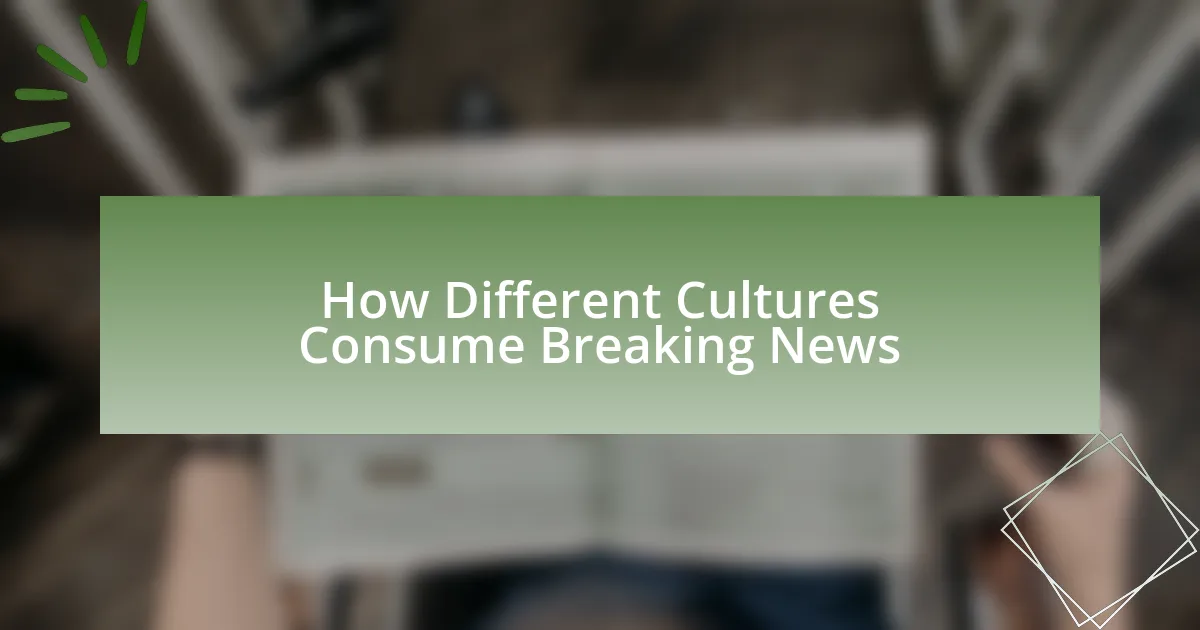Ethical dilemmas in breaking news journalism arise from the conflict between the public’s right to know and the potential harm that sensitive information may cause. Journalists face pressures to report quickly, which can compromise accuracy and ethical standards, leading to misinformation and public mistrust. Key scenarios include conflicts of interest, the urgency of reporting, and balancing public interest with individual privacy rights. The article outlines the principles guiding ethical journalism, the consequences of unethical practices, and strategies for responsible reporting, emphasizing the importance of accuracy, fairness, and transparency in maintaining public trust. Additionally, it discusses the role of professional organizations and ethics training in supporting journalists as they navigate these complex challenges.

What are Ethical Dilemmas in Breaking News Journalism?
Ethical dilemmas in breaking news journalism primarily involve the conflict between the public’s right to know and the potential harm that reporting certain information may cause. Journalists often face situations where they must decide whether to publish sensitive details that could endanger individuals, compromise ongoing investigations, or spread misinformation. For instance, during crises, the urgency to report can lead to the dissemination of unverified information, which can exacerbate panic or lead to public mistrust. Additionally, ethical guidelines emphasize the importance of accuracy and fairness, yet the pressure to be first can compromise these principles, resulting in incomplete or biased reporting. These dilemmas highlight the need for journalists to balance their responsibilities to inform the public with their ethical obligations to protect individuals and maintain journalistic integrity.
Why do ethical dilemmas arise in breaking news journalism?
Ethical dilemmas arise in breaking news journalism primarily due to the conflict between the public’s right to know and the potential harm that may result from the dissemination of sensitive information. Journalists often face pressure to report quickly on unfolding events, which can lead to the prioritization of speed over accuracy and ethical considerations. For instance, during crises, revealing the identities of victims or sensitive details can cause distress to families and communities, raising questions about the moral responsibility of journalists. Additionally, the competitive nature of the media landscape can exacerbate these dilemmas, as outlets may prioritize sensationalism to attract viewership, further complicating ethical decision-making.
What are the common scenarios that lead to ethical dilemmas?
Common scenarios that lead to ethical dilemmas in breaking news journalism include conflicts of interest, where journalists must choose between personal relationships and professional integrity; the pressure to report quickly, which can compromise accuracy; and the challenge of balancing public interest with individual privacy rights. For instance, during a crisis, journalists may face the dilemma of whether to publish sensitive information that could harm individuals involved. These scenarios are supported by the Society of Professional Journalists’ Code of Ethics, which emphasizes the importance of truth and minimizing harm, highlighting the ongoing tension journalists navigate in their reporting.
How do time constraints impact ethical decision-making?
Time constraints significantly impair ethical decision-making by limiting the time available for thorough analysis and reflection. Journalists under tight deadlines may prioritize speed over accuracy, leading to potential misinformation or ethical oversights. Research indicates that when faced with time pressure, individuals often rely on heuristics or shortcuts, which can result in biased or less ethical choices. For instance, a study published in the Journal of Business Ethics found that time constraints can lead to a decrease in ethical awareness and an increase in unethical behavior among professionals. This highlights the critical need for journalists to balance the urgency of breaking news with the ethical standards of their profession.
What principles guide ethical journalism?
The principles that guide ethical journalism include accuracy, fairness, independence, accountability, and transparency. Accuracy ensures that information is correct and verified before publication, which is crucial in maintaining public trust. Fairness involves presenting all sides of a story without bias, allowing for a balanced perspective. Independence requires journalists to avoid conflicts of interest, ensuring that their reporting is not influenced by external pressures. Accountability means that journalists must take responsibility for their work and correct any errors promptly. Transparency involves being open about sources and methods, which fosters trust with the audience. These principles are widely recognized in ethical codes, such as the Society of Professional Journalists’ Code of Ethics, which emphasizes the importance of these values in maintaining journalistic integrity.
How do accuracy and fairness play a role in ethical journalism?
Accuracy and fairness are fundamental principles in ethical journalism, ensuring that reporting is truthful and balanced. Accuracy involves verifying facts and presenting information without distortion, which builds trust with the audience and upholds the integrity of the news. Fairness requires journalists to represent all sides of a story, providing context and avoiding bias, which fosters a more informed public discourse. For instance, the Society of Professional Journalists emphasizes that ethical journalism should be accurate and fair, highlighting that misrepresentation can lead to misinformation and public harm. Thus, both accuracy and fairness are essential for maintaining credibility and accountability in journalism.
What is the significance of transparency in reporting?
Transparency in reporting is crucial as it fosters trust between journalists and the public. When news organizations are transparent about their sources, methods, and potential biases, they enhance credibility and allow audiences to critically evaluate the information presented. For instance, a study by the Pew Research Center found that 70% of Americans believe that transparency in reporting is essential for a trustworthy news media. This level of trust is vital for a functioning democracy, as it encourages informed citizen participation and accountability in journalism.
What are the consequences of unethical practices in breaking news journalism?
Unethical practices in breaking news journalism lead to significant consequences, including the erosion of public trust, misinformation dissemination, and potential legal repercussions. When journalists prioritize sensationalism over accuracy, they compromise the integrity of the news, resulting in audiences questioning the reliability of media sources. For instance, a 2020 study by the Pew Research Center found that 63% of Americans believe that news organizations often report news that is inaccurate. Additionally, unethical reporting can lead to legal actions against media outlets, as seen in cases where defamation lawsuits arise from false reporting. These consequences highlight the critical importance of ethical standards in journalism to maintain credibility and accountability.
How can misinformation affect public trust in journalism?
Misinformation significantly undermines public trust in journalism by creating skepticism about the accuracy and reliability of news sources. When audiences encounter false or misleading information, they may question the integrity of journalists and media organizations, leading to a decline in credibility. Research conducted by the Pew Research Center in 2020 found that 53% of Americans believe that news organizations intentionally mislead the public, which illustrates the pervasive impact of misinformation on public perception. This erosion of trust can result in decreased engagement with news media, as individuals may turn to alternative sources, including social media, which often lack rigorous fact-checking processes.
What legal repercussions can journalists face for unethical reporting?
Journalists can face legal repercussions such as defamation lawsuits, invasion of privacy claims, and potential criminal charges for unethical reporting. Defamation occurs when false information is published that harms an individual’s reputation, leading to civil lawsuits where the journalist may be required to pay damages. Invasion of privacy claims arise when journalists disclose private facts without consent, which can also result in legal action. Additionally, unethical reporting practices, such as fabricating sources or information, can lead to criminal charges in cases of fraud or obstruction of justice. These legal consequences underscore the importance of ethical standards in journalism to avoid harm and maintain credibility.
How do journalists navigate ethical dilemmas in practice?
Journalists navigate ethical dilemmas in practice by adhering to established codes of ethics, engaging in critical thinking, and consulting with colleagues or editors. These codes, such as those from the Society of Professional Journalists, emphasize principles like accuracy, fairness, and minimizing harm. For instance, when covering sensitive topics, journalists assess the potential impact of their reporting on individuals and communities, balancing the public’s right to know with the need to protect vulnerable subjects. Additionally, they often rely on peer discussions to gain diverse perspectives, which can help clarify complex ethical situations. This collaborative approach reinforces accountability and promotes ethical decision-making in journalism.
What role do editorial guidelines play in ethical decision-making?
Editorial guidelines serve as a framework for ethical decision-making in journalism by establishing standards for accuracy, fairness, and accountability. These guidelines help journalists navigate complex situations, ensuring that their reporting adheres to ethical principles and minimizes harm. For instance, the Society of Professional Journalists emphasizes the importance of verifying information before publication, which directly supports ethical practices by promoting truthfulness and integrity in reporting. By providing clear protocols, editorial guidelines empower journalists to make informed decisions that uphold public trust and foster responsible journalism.
How can journalists balance urgency with ethical considerations?
Journalists can balance urgency with ethical considerations by prioritizing accuracy and context in their reporting. This involves verifying information before publication, even in fast-paced situations, to prevent the spread of misinformation. For instance, during the Boston Marathon bombing in 2013, many outlets rushed to report unverified details, leading to confusion and harm. Ethical guidelines, such as those from the Society of Professional Journalists, emphasize the importance of minimizing harm and ensuring the truth, which can guide journalists in making responsible decisions under pressure. By adhering to these principles, journalists can maintain credibility while addressing the need for timely news.
What are some best practices for ethical breaking news journalism?
Best practices for ethical breaking news journalism include verifying information before publication, ensuring accuracy, and providing context. Journalists should cross-check facts with multiple reliable sources to avoid spreading misinformation, as seen in the case of the 2016 U.S. presidential election, where false information circulated widely. Additionally, respecting the privacy and dignity of individuals involved in breaking news stories is crucial; for instance, refraining from sensationalizing tragedies can prevent further harm to affected families. Transparency about sources and methods used in reporting enhances credibility and trust with the audience. Lastly, adhering to established ethical guidelines, such as those from the Society of Professional Journalists, reinforces the commitment to responsible journalism.
How can journalists ensure they are reporting responsibly during crises?
Journalists can ensure they are reporting responsibly during crises by adhering to ethical standards, verifying information before publication, and prioritizing the well-being of affected individuals. Responsible reporting involves cross-checking facts with multiple reliable sources to avoid the spread of misinformation, as evidenced by the 2019 study published in the Journal of Communication, which highlighted that accurate reporting significantly reduces public panic during emergencies. Additionally, journalists should consider the potential impact of their stories on vulnerable populations, as ethical guidelines from organizations like the Society of Professional Journalists emphasize the importance of minimizing harm.
What strategies can journalists use to verify information quickly?
Journalists can use several strategies to verify information quickly, including cross-referencing multiple credible sources, utilizing fact-checking websites, and employing social media verification tools. Cross-referencing involves checking the same information against various reputable news outlets or official statements to confirm accuracy. Fact-checking websites, such as Snopes or FactCheck.org, provide reliable assessments of claims and can expedite the verification process. Social media verification tools, like CrowdTangle or TweetDeck, help journalists track the origin of information and assess its credibility based on engagement metrics and source reliability. These strategies are essential in maintaining journalistic integrity and ensuring accurate reporting in fast-paced news environments.
What resources are available for journalists facing ethical dilemmas?
Journalists facing ethical dilemmas can access several resources, including professional organizations, ethical guidelines, and peer support networks. Organizations such as the Society of Professional Journalists (SPJ) provide a Code of Ethics that outlines principles for ethical decision-making. Additionally, the International Federation of Journalists (IFJ) offers resources and training on ethical journalism practices. Peer support networks, such as local journalist associations, can also provide a platform for discussing ethical challenges and sharing experiences. These resources collectively help journalists navigate complex ethical situations effectively.
How can professional organizations support ethical journalism?
Professional organizations can support ethical journalism by establishing and enforcing codes of ethics that guide journalists in their reporting practices. These organizations, such as the Society of Professional Journalists, provide resources, training, and workshops that emphasize the importance of accuracy, fairness, and accountability in journalism. For instance, the SPJ’s Code of Ethics outlines principles such as seeking truth and reporting it, minimizing harm, and acting independently, which serve as a framework for ethical decision-making. Additionally, professional organizations can advocate for press freedom and provide legal support to journalists facing ethical dilemmas, thereby reinforcing the standards of ethical journalism in the industry.
What role do ethics training programs play in preparing journalists?
Ethics training programs play a crucial role in preparing journalists by equipping them with the knowledge and skills necessary to navigate complex ethical dilemmas in their reporting. These programs provide a framework for understanding ethical standards, such as accuracy, fairness, and accountability, which are essential in maintaining public trust. Research indicates that journalists who undergo ethics training are better prepared to make informed decisions when faced with challenging situations, as they can apply learned principles to real-world scenarios. For instance, a study published in the “Journalism & Mass Communication Educator” found that ethics training significantly improved journalists’ ability to identify ethical issues and respond appropriately, thereby enhancing the overall integrity of the news media.
What are the future challenges for ethical breaking news journalism?
Future challenges for ethical breaking news journalism include the rapid spread of misinformation, the pressure for speed over accuracy, and the need for transparency in reporting. Misinformation can undermine public trust and lead to harmful consequences, as seen during events like the COVID-19 pandemic, where false information circulated widely. The increasing demand for immediate news can compromise journalistic standards, as reporters may prioritize speed over thorough fact-checking, leading to inaccuracies. Additionally, transparency is essential for maintaining credibility; journalists must clearly communicate their sources and methods to foster trust among audiences. These challenges necessitate a commitment to ethical standards and continuous adaptation to the evolving media landscape.
How might technology influence ethical dilemmas in journalism?
Technology significantly influences ethical dilemmas in journalism by enabling rapid information dissemination while complicating the verification process. The rise of social media platforms allows journalists to share news instantly, but this immediacy can lead to the spread of misinformation if sources are not thoroughly vetted. For instance, a study by the Pew Research Center found that 64% of Americans believe that fabricated news stories cause confusion about basic facts, highlighting the ethical responsibility journalists face in ensuring accuracy. Additionally, the use of algorithms in news curation can create echo chambers, where audiences are exposed only to viewpoints that reinforce their beliefs, raising ethical concerns about impartiality and the role of journalists in fostering informed public discourse.
What emerging trends should journalists be aware of regarding ethics?
Journalists should be aware of the emerging trend of misinformation and the ethical responsibility to verify facts before publication. With the rise of social media and instant news dissemination, the potential for spreading false information has increased significantly, leading to ethical dilemmas regarding accuracy and accountability. According to a 2021 study by the Pew Research Center, 64% of Americans believe that misinformation is a major problem in the news, highlighting the urgent need for journalists to prioritize fact-checking and source verification to maintain public trust.
How can journalists improve their ethical decision-making skills?
Journalists can improve their ethical decision-making skills by engaging in continuous education and training focused on ethics in journalism. Regular workshops and courses that cover ethical frameworks, case studies, and real-world dilemmas enhance understanding and application of ethical principles. For instance, the Society of Professional Journalists offers resources and guidelines that help journalists navigate complex situations. Additionally, peer discussions and mentorship programs can provide practical insights and diverse perspectives, reinforcing ethical standards in decision-making processes.



